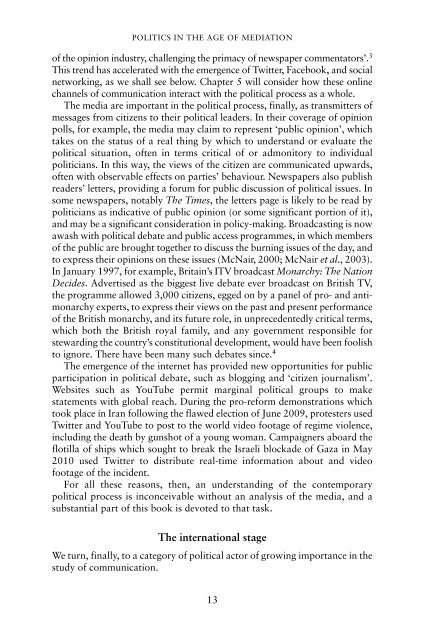20130412164339753295_book_an-introduction-to-political-communication
20130412164339753295_book_an-introduction-to-political-communication
20130412164339753295_book_an-introduction-to-political-communication
Create successful ePaper yourself
Turn your PDF publications into a flip-book with our unique Google optimized e-Paper software.
POLITICS IN THE AGE OF MEDIATION<br />
of the opinion industry, challenging the primacy of newspaper commenta<strong>to</strong>rs’. 3<br />
This trend has accelerated with the emergence of Twitter, Face<strong>book</strong>, <strong>an</strong>d social<br />
networking, as we shall see below. Chapter 5 will consider how these online<br />
ch<strong>an</strong>nels of <strong>communication</strong> interact with the <strong>political</strong> process as a whole.<br />
The media are import<strong>an</strong>t in the <strong>political</strong> process, finally, as tr<strong>an</strong>smitters of<br />
messages from citizens <strong>to</strong> their <strong>political</strong> leaders. In their coverage of opinion<br />
polls, for example, the media may claim <strong>to</strong> represent ‘public opinion’, which<br />
takes on the status of a real thing by which <strong>to</strong> underst<strong>an</strong>d or evaluate the<br />
<strong>political</strong> situation, often in terms critical of or admoni<strong>to</strong>ry <strong>to</strong> individual<br />
politici<strong>an</strong>s. In this way, the views of the citizen are communicated upwards,<br />
often with observable effects on parties’ behaviour. Newspapers also publish<br />
readers’ letters, providing a forum for public discussion of <strong>political</strong> issues. In<br />
some newspapers, notably The Times, the letters page is likely <strong>to</strong> be read by<br />
politici<strong>an</strong>s as indicative of public opinion (or some signific<strong>an</strong>t portion of it),<br />
<strong>an</strong>d may be a signific<strong>an</strong>t consideration in policy-making. Broadcasting is now<br />
awash with <strong>political</strong> debate <strong>an</strong>d public access programmes, in which members<br />
of the public are brought <strong>to</strong>gether <strong>to</strong> discuss the burning issues of the day, <strong>an</strong>d<br />
<strong>to</strong> express their opinions on these issues (McNair, 2000; McNair et al., 2003).<br />
In J<strong>an</strong>uary 1997, for example, Britain’s ITV broadcast Monarchy: The Nation<br />
Decides. Advertised as the biggest live debate ever broadcast on British TV,<br />
the programme allowed 3,000 citizens, egged on by a p<strong>an</strong>el of pro- <strong>an</strong>d <strong>an</strong>timonarchy<br />
experts, <strong>to</strong> express their views on the past <strong>an</strong>d present perform<strong>an</strong>ce<br />
of the British monarchy, <strong>an</strong>d its future role, in unprecedentedly critical terms,<br />
which both the British royal family, <strong>an</strong>d <strong>an</strong>y government responsible for<br />
stewarding the country’s constitutional development, would have been foolish<br />
<strong>to</strong> ignore. There have been m<strong>an</strong>y such debates since. 4<br />
The emergence of the internet has provided new opportunities for public<br />
participation in <strong>political</strong> debate, such as blogging <strong>an</strong>d ‘citizen journalism’.<br />
Websites such as YouTube permit marginal <strong>political</strong> groups <strong>to</strong> make<br />
statements with global reach. During the pro-reform demonstrations which<br />
<strong>to</strong>ok place in Ir<strong>an</strong> following the flawed election of June 2009, protesters used<br />
Twitter <strong>an</strong>d YouTube <strong>to</strong> post <strong>to</strong> the world video footage of regime violence,<br />
including the death by gunshot of a young wom<strong>an</strong>. Campaigners aboard the<br />
flotilla of ships which sought <strong>to</strong> break the Israeli blockade of Gaza in May<br />
2010 used Twitter <strong>to</strong> distribute real-time information about <strong>an</strong>d video<br />
footage of the incident.<br />
For all these reasons, then, <strong>an</strong> underst<strong>an</strong>ding of the contemporary<br />
<strong>political</strong> process is inconceivable without <strong>an</strong> <strong>an</strong>alysis of the media, <strong>an</strong>d a<br />
subst<strong>an</strong>tial part of this <strong>book</strong> is devoted <strong>to</strong> that task.<br />
The international stage<br />
We turn, finally, <strong>to</strong> a category of <strong>political</strong> ac<strong>to</strong>r of growing import<strong>an</strong>ce in the<br />
study of <strong>communication</strong>.<br />
13
















